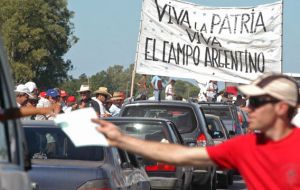MercoPress. South Atlantic News Agency
Argentine farmers' conflict resumes in uncharted terrain
 Farmers launch new 8-day lockout
Farmers launch new 8-day lockout Frustrated Argentine farmers returned on Wednesday to protest pickets in the country's highways following 21 days of conflict and 36 of truce during which no sound agreements were reached with the reluctant and stubborn President Kirchner administration.
The new eight day protest was announced by representatives from the four organizations behind the farmers' successful mobilization and will be limited to prevent the supply of trucks with export grains and international transport. However normal supply of food "is a priority and trucks loaded with food will be let through", contrary to what happened during most of the 21 day conflict which began in early March. "There will be no food shortages". "After 57 days no advance was reached. We at all times were willing to concert, to advance but from the government it was decided to confront. The only decision was confrontation and we've given proof of an enormous patience", said Eduardo Buzzi president of the Agrarian Federation. Argentine farmers are protesting a steep increase in grains and oil seeds export taxes decided early March, plus other grievances which extend to most farm sectors in spite of the global booming commodities prices. The Kirchner administration argues that windfall earnings must be taxed to ensure a redistribution of income in Argentina. Farmers announced open meetings, informing public opinion of their situation and will also request interviews with elected municipal officials and provincial governors to explain the impact of the sliding export taxing system. Representatives from the four organizations during the press conference spoke about their personal experiences during the month long round of frustrated talks and permanent provocations from a government "which played to divide us but failed. Our liaison committee has never been more united and effective" Buzzi said that Agriculture Secretary Javier de Urquiza admitted he had no latitude to negotiate and even praised Alberto Fernandez, cabinet chief who chaired the meetings; "we know he was making a tremendous effort to find a solution, although he doesn't know much about camp issues, but it was obvious that he wasn't running the show and his instructions were others". Farmers also pointed out that they have been blamed for "inflation, grassland fires and now possibly even for the volcanic ashes", but insisted that they are struggling for a united Argentina that is in condition of "doubling, trebling production" taking advantage of the very positive international situation for agriculture. They also underlined that "we have been infamously accused" of helping to repeat "1976 (military coup) and 2001 (default)", but "we are fully behind democratic institutions and dialogue. People know that and that is why they supported us all along. We want a strong, democratic, federal Argentina, not a Unitarian Argentina where all decisions are taken in Buenos Aires". Cabinet Chief Alberto Fernandez was quoted criticizing farmers' decision: "it's not possible for farm leaders to talk about dialogue and at the same time promote a new strike because they haven't achieved what they wanted". "This is an unbearable extortion", said Fernandez adding that the people must know that during the 21 day strike "the cost of living for city residents soared 15%". The Buenos Aires press interviewed several experts about the future of the conflict particularly after the eight days are over. Rosendo Fraga a renowned Argentine political analyst and historian said that the Kirchner government strategy has been to divide farmers "not solve the problem" hoping for grass roots to commit protest excesses. But this attitude will further "deteriorate the image of Mrs. Kirchner and boost inflation", he added. Sergio Berensztein from consultants Poliarquia had a similar approach as to the government purposes adding that "the truce and possible agreement was interpreted as a political defeat". He added the government kept moving the field and dragging its feet so no agreement was reached trying to show farmers as culprits, and the people and government as victims. "Now both sides will struggle to see how much urban support they can ensure, media coverage, and the government mighty possibly again appeal to its urban pickets", said Berensztein. "Government has the key to the solution but it will fathom the president's image and if the status quo can be manageable until camp gives up, or in the worst scenario pull back the sliding export taxes that triggered the conflict in first place". Ricardo Rouvier another public opinion consultant says the Kirchner administration dilemma is "strength and time". The longer the conflict the worst for both sides, but the government is determined to show "who's the boss".




Top Comments
Disclaimer & comment rulesCommenting for this story is now closed.
If you have a Facebook account, become a fan and comment on our Facebook Page!